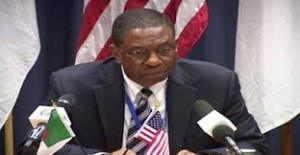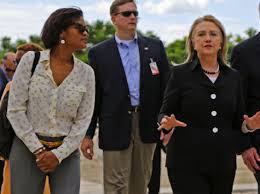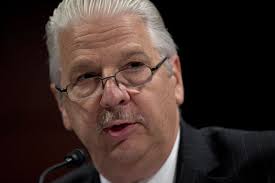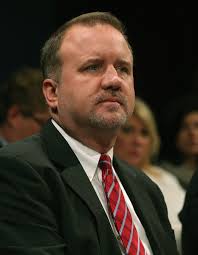Just four days ago I stated that the deaths of Ambassador Chris Stevens, Sean Smith, Tyrone Woods and Glen Doherty can be attributed to Hillary Clinton’s decision to cut back security at the Benghazi mission compound. (See my post Lack of security in Benghazi points to Clinton, 9/13/14.) Two more events tend to support my contention that confidants aided in the cover-up.
An after-hours document scrubbing at State

Sharyl Attkisson interviewed former state department official Raymond Maxwell about an after-hours document scrubbing. (realclearpolitics.com)

Former state department official Raymond Maxwell told Sharyl Attkisson about an after-hours document scrubbing. (whatamimissisnghere.com)
Two days after that post, Sharyl Attkisson broke a story of a Sunday after-hours document scrubbing in the basement operations center at the State Department. Her source was former Deputy Assistant Secretary Raymond Maxwell, who was a leader in the Bureau of Near Eastern Affairs, charged with collecting e-mails and documents relevant to the Benghazi probe. He was a 21-year Foreign Service veteran at State.
Hearing about the document scrubbing effort, he decided to look into it. Upon arrival he observed boxes and stacks of documents and the presence of one of Clinton’s top advisors. She told Maxwell, “We are to go through these stacks and pull out anything that might put anybody in the front office or the seventh floor in a bad light.” The seventh floor was where Clinton and her principal advisors were located.

Maxwell said Cheryl Mills, at left, was present at the after-hours document scrubbing. (Breitbart.com)
At one point Clinton confidants Cheryl Mills and Jake Sullivan appeared on the scene. “Who are you?” snapped Mills, according to Maxwell. When Sullivan explained who he was, she said, “Well, okay.” Uneasy with what was going on, Maxwell soon departed. Mills and Sullivan did not respond to inquiries about the scrubbing.
The Accountability Review Board was supposed to get unfettered access to all documents, but if that were so, what was going on in that after-hours activity?
Day 1 of House Select Committee Hearing

State Department security official Greg Starr was interviewed by the House Select Committee on Benghazi. (palmbeachpost.com)
While the hearing on Day 1 of the House Select Committee on Benghazi today got off to a slow, boring start as the State Department’s Assistant Secretary for Diplomatic Security Gregory Starr gave new meaning to the term bureaucrat. Not only did he admit that he wasn’t at the State Department when Benghazi was attacked, he painfully took the committee through a long list of ARB recommendation progress, often using department acronyms and lingo.
Rejoining the State Department in February 2013, after a stint at the UN, Starr belabored over the work undertaken to put the ARB’s recommendations in place over the past year and a half. His incompetence was highlighted by the fact that he was unfazed by the failure of Secretary John Kerry to agree to a new key security position at State. And when asked by Rep. Elijah Cumming’s (D-MD) for a status report on seven key areas of ARB concern still being studied, he was ill prepared, and finally agreed to respond in 45 days.

Diplomatic security expert Todd Keil was on the panel interviewed by the House Select Committee on Benghazi. (Zimbio.com)
Rep. Jim Jordan (R-OH) gave life to the hearing as he called upon panel member Todd Keil to comment on the so-called “independent” ARB. With knowledge that co-chairman Admiral Mike Mullen had shared findings with State Department officials, including Clinton advisor Cheryl Mills, Keil said, “I don’t think that fits anyone’s definition of being fiercely independent.”
“I was there the day Admiral Mullen testified, and I have to disagree with you,” said Rep. Tammy Duckworth (D-IL) as she reviewed his 43-year military career, “(but he) comes before this committee and swears an oath of office and then testifies he was fiercely independent in the ARB, I would tend to believe him.”
Keil reminded her that he said under oath that he did discuss the proceedings with outside parties. “It’s a statement of fact: It’s not a subjective judgment.” Duckworth was silent.
The House Select Committee has subpoena power and is expected to call Maxwell, Mills and others to testify.
Parts 1-5 of, And she wants to be president, can be found in the archives at right.





